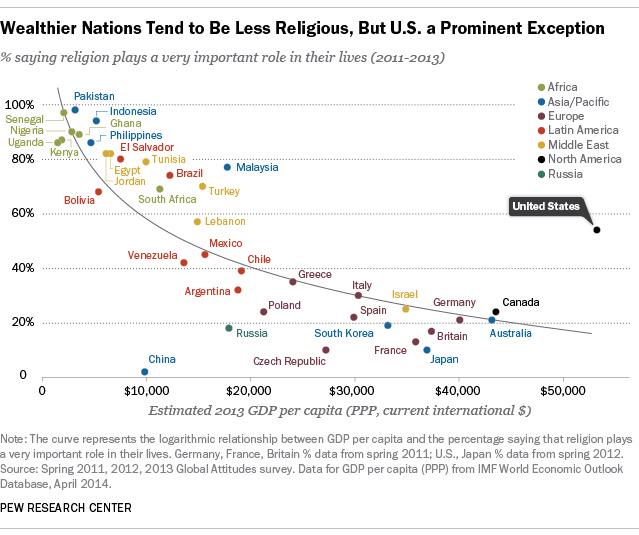The thing about “American exceptionalism” is that it’s mostly an applause light, that is, “not so much a propositional statement, as the equivalent of the ‘Applause’ light that tells a studio audience when to clap.” Occasionally, though, we Americans truly do stand out, in the sort of way that can be measured and observed and pondered. The graph below is one of those rare examples:
Data on religiosity + wealth. MT @FactTank: How do Americans stand out from rest of world? http://t.co/uZZpSklRx2 pic.twitter.com/NcmFTnA1eM
— Pew Research Religion (@PewReligion) March 12, 2015

Notice that the logarithmic relationship holds for most nations, but that China and the United States are well off the best fit line. You don’t have to go further than Mao to figure out why China isn’t terribly religious, but it’s a bit trickier to explain American exceptionalism in this case. My best guess is the confluence of two major factors: free minds and free markets. The U.S. was formed as the first secular republic, writing Jeffersonian/Madisonian ideas about secularism directly into the Constitution, and the decoupling of the church from the state allowed for a profusion of Christian and other sects to mutate and spread throughout the land free from the stultifying effects of a state institutional religion. Meanwhile, our national dedication to free markets accounts for our collective inability/unwillingness to create the sort of robust social saftey nets that are typical in similarly wealthy European nations. In the face of ongoing economic insecurity, Americans who might well have made use of those nets instead turn to the local church or temple or mosque for community support.
Of course, this is only a working hypothesis. To be even mildly convincing to quantitatively-minded skeptics, I’m going to need to show that I can construct model which creates a tighter fit than the one featured here.
